- Home
- Alex Berenson
The Shadow Patrol jw-6 Page 7
The Shadow Patrol jw-6 Read online
Page 7
Duto’s next choice was Gordie King, an agency veteran who’d spent most of his career in South America. Wells understood the choice. King had a reputation as an old-school butt-kicker. Unfortunately, King didn’t speak Pashtun and disliked Afghanistan intensely. He rarely left his office when he was in Kabul. Making matters worse, he refused to choose a deputy.
Under King, the station slipped into crisis. Case officers cut their tours short and were not replaced. Senior officers in Afghanistan’s intelligence service began skipping their weekly meetings with the agency. Two top sources in eastern Afghanistan were assassinated. Fifteen months after Marburg, the CIA’s intelligence-gathering effort in Afghanistan existed mostly on paper. Its operations consisted of drone strikes and payoffs to supposedly friendly tribal chiefs.
In the medium term, the problems made little difference to the war. The soldiers and Marines in Kandahar and Helmand provinces didn’t need the CIA’s help to kill Taliban guerrillas. But in the long run, the CIA’s role was crucial. Military intelligence officers weren’t supposed to spy on the Afghan government or explore the relationships between the insurgents and Iran and Pakistan. Those jobs belonged to the CIA. But as the agency slipped, the Defense Intelligence Agency began recruiting its own sources in Kabul and all over Afghanistan.
Duto faced an unpleasant choice. Replacing King would mean admitting a big mistake, and Duto hated admitting mistakes. But he hated losing turf even more, especially since Afghanistan had always belonged to the CIA. The agency had helped battle the Soviets in the 1980s. After September 11, while the Pentagon dithered, CIA operatives helped push the Taliban from power.
And so Duto sent King home barely eleven months after naming him as station chief. In his place, Duto appointed Ron Arango, a solid officer who had served in Pakistan and Russia. As deputy, he chose Peter Lautner, who had been in Kabul for seven years. Lautner was known as especially aggressive. He had reason to be. He’d lost his wife and his brother to Marburg.
Under Arango and Lautner, the station seemed to be recovering. Lautner had rebuilt relationships with tribal leaders. Arango had taken five top Afghan intelligence officers to a counterinsurgency conference that was a thinly disguised bribe, an excuse for a vacation in Paris.
But despite the activity, the station was still foundering. Some of its recent intel had proven flat wrong. A month before, one of its best sources had reported that a senior Taliban commander wanted to defect. The “defection” was a hoax, leading to an ambush that killed an Afghan general. The station still didn’t know whether its source had lied or been used to pass along disinformation. Worst of all, the station had just lost another top agent, the deputy interior minister. A bomb hidden in a fuel tank had blown apart the minister’s armored 4Runner.
With all the problems, Wells wasn’t surprised that the station had largely been left out of the hunt for bin Laden. Langley and the Pentagon had directed the operation, with help from the NSA. Kabul had barely been involved.
SHAFER HAD OFFERED to let Wells stay in a spare bedroom while he waded through the reports. But Wells wanted to read the files without having Shafer quiz him like an annoying high school teacher. So Wells was staying a few miles from Langley in a Courtyard by Marriott. He liked Courtyards and Hilton Garden Inns and the other three-star hotels that sat on suburban feeder roads, bland, efficient boxes where every room was identical and no one noticed anyone. Every day he woke at six and worked out in the Marriott’s underwhelming gym for ninety minutes. He reached the agency by nine o’clock and read files for twelve hours, until his eyes burned. Then he headed back to the hotel.
Wells had converted to Islam more than a decade before, but in the last few months he’d hardly prayed at all. He wondered whether he’d ever regain his fervor. Perhaps he’d grown permanently weary of battling jihadis born into the religion he wanted to claim as his own. He kept his Quran on his bedside table, but he didn’t pray. Instead he watched baseball until he fell asleep, rooting for close games and miracle finishes, trading one faith for another.
After a week reading files, Wells had grown to sense the station’s different personalities. Arango, the chief of station, wrote in a businesslike, slightly bureaucratic tone. Lautner had an aggressive edge. Gabe Yergin, the number three, was hurried, almost sloppy, as though he were perpetually behind schedule, running between meetings.
By Friday night, Wells had nearly finished the files. His mouth was dry, his eyes scratchy from the closet’s stale air. Office work left him tired, but not in an honest, muscle-sore way. He wanted to put a pack on his back and hike for twenty-four hours straight. He looked up as the magnetic lock clicked open and Shafer stepped in.
“You look dazed.”
“I thought we were trying to reduce the amount of paperwork the stations generate.”
“That’s a work in progress. Plenty of memos going around about it, though.”
Wells laughed.
“You caught up?”
“Pretty much.”
“Duto wants to see you, talk about it.”
“He works this late?”
“You kidding? He’s got some fancy dinner tonight. With Travers and McTeague, I think.” Congressman Raymond Travers and Senator Hank McTeague were the chairmen of the House and Senate committees that oversaw the CIA. “Duto will tell them stories about Sarkozy and Carla Bruni, make them think they heard something that they couldn’t have read on Page Six.”
“Sounds like fun.”
“Better him than us. Anyway, he’s coming by your hotel at ten tomorrow. I’ll be there, too. Try not to sleep late.”
“Yes, Your Highness.”
WELLS STEPPED OUT of the Courtyard’s freshly mopped lobby at ten the next day, just as a black Chevy Tahoe rolled up the driveway. Inside the Tahoe, Duto and Shafer. Duto wore the weekend uniform of the powerful, gray windbreaker, blue shirt, pressed khakis. He was nearly sixty, and his hair had thinned since Wells had seen him. Otherwise he hadn’t changed. His handshake was firm. His smile was all lips and no eyes.
They rolled out, turned left toward D.C. Two identical black Tahoes followed.
“Subtle pickup,” Wells said. “You should just paint ‘CIA Taxi’ on the doors.”
Wells and Duto didn’t get along. Their mistrust wasn’t playful. It wasn’t a light banter that hid mutual affection. They simply disliked each other. Wells had quit the agency because of Duto. Yet they seemed to need each other. Several months before, the CIA had helped Wells on his mission to Saudi Arabia. Now it was Duto’s turn to ask for a favor.
“How are you, John?” Duto’s voice was quiet. Almost silky. Wells wondered whether Duto was taking vocal training. He had once been famous for his temper. But years as director had taught him restraint. Let others squabble. The ultimate decision belongs to me. No need to show my claws. Wells wanted Duto to go back to being a screamer, but so far Wells hadn’t managed to provoke him.
“Fine.”
“And Anne?”
“She’s fine, too.” Wells wondered whether Duto remembered her name or had been briefed. “Though my son seems to have decided I’m a war criminal. Never wants to see me again.”
“That’s too bad.” Duto didn’t exactly sound torn up.
“I’m sure he thinks even worse of you.”
“They have no idea what we do for them. What it takes to keep them safe.”
“We’re five miles from the Pentagon,” Shafer said. “Around here, most of them are us.”
“You know what I mean. Civilians.”
“They know exactly what we do,” Wells said. “That’s the problem.”
“We killed Osama. And no civilian casualties in the op. Not one. Ten years since nine/eleven and no real attacks on American soil. Not even jerks with AKs lighting up a mall. We’ve kept our people safe. Tell me that doesn’t count for something, John.”
They turned onto the Chain Bridge. Wells watched the Potomac rush by. Knowing he’d have to answer. Knowing Duto was right. “Ok
ay. You win. You sound like you’re planning to run for something—”
A smile curled Duto’s mouth and then was gone, brief and shocking as lightning in a cloudless sky. Suddenly, the good suits and voice lessons and personality transplant made sense. Impossible, Wells almost said. You’re only fooling yourself.
Duto was more powerful than any senator or congressman. Only one elected office would be worth his effort. But the presidency was off-limits to anyone too deeply involved with the agency. The first George Bush was the only director ever to have won the presidency, and he’d served at Langley barely a year. Duto had spent most of his adult life at the CIA. His fingerprints were on the agency’s most controversial programs. His record couldn’t possibly bear public scrutiny.
But if his smile was any indication, Duto thought it might.
“Anyway,” Wells said. “Unless you want more awkward small talk—”
“You read the cables. What do you think? Operationally speaking.”
“You already know the answer. It’s a mess. Been one since Marburg. Wultse was a drunk, Gordie King was burned out. The new guys, Arango and Lautner, they look good, they’re saying the right things and maybe doing them, too, but they’ve been there awhile and so far they haven’t made progress. If Kabul ran half as well as Islamabad, we’d have won the war by now.”
“Can they? Make progress?”
“I’m not going to pass judgment from seven thousand miles away on guys I’ve never met.”
“So you’ll go see them then?”
“Vinny. What is it you’re not telling me?”
“Right now, Kabul’s our most important station. More than Moscow, Beijing, whatever. If I have to change it up again, I will. But that would be the fourth new chief since Marburg. And it’s not like I have great options. I don’t want to move anyone from Islamabad now that they’re getting traction. I don’t want to bring someone else in from outside the region unless I have to. I want an outside opinion and I know you’ll tell me what you think.”
Wells looked at Shafer. “Okay, I’ll ask you. What is it he’s not telling me?”
“That there might be a leak inside the station.”
“To the Taliban? Come on.”
“About a month ago, a source told one of our Pak officers about a rumor that, quote unquote, ‘A CIA officer is helping the Talib.’”
“That could mean anything.”
“I know. We asked him for more. He didn’t have it. He’s a good source, though. A Frontier Corps general.” The Frontier Corps was the Pakistan Army unit that guarded Pakistan’s North-West Frontier province.
“That’s all you have?”
“I know it’s thin—”
“It’s not thin. It’s nothing.”
“It isn’t all,” Duto said quietly. Wells and Shafer both swiveled toward Duto. Duto was smiling again. Shafer wasn’t. His mouth had opened a half inch, like an ATM machine about to spit cash. Apparently Duto hadn’t told Shafer about a second source either. “About ten days ago, I got a call from Mike Yancy.”
“Should I know that name?” Wells said.
“Deputy director of the Drug Enforcement Agency.”
“Their motto: A palace for every kingpin.”
“Thank you for that wit and wisdom, Ellis. So the DEA has offices in Kandahar and Helmand. They try to convince farmers to stop planting poppies, switch to food crops like wheat. It’s tough. You can imagine. Opium’s much more profitable.”
“Sure,” Wells said.
“Anyway, the DEA guys were in a village — and before you ask, Yancy didn’t say which one, told me he couldn’t — and this farmer takes them aside and says to them, ‘Why should I work with you when the CIA is buying opium?’ The DEA guys say, ‘No, that can’t be right.’ But he insists. Tells them that he knows that the CIA is working with the Talibs. But no specifics.”
“How would it work?” Wells said. “A CO goes outside the wire, comes back with a suitcase of junk? How does he make sure he doesn’t get blown to bits or kidnapped? And what does he do with the stuff then? Put it out at the Christmas party?”
“Yancy said his agents felt this farmer was credible. He talked to them alone, didn’t want anyone to hear.”
“Let me walk through this,” Shafer said. “A farmer in Kandahar whose name we don’t know told a DEA agent whose name we don’t know about a dirty CIA officer whose name we don’t know. Now you’re telling us. That’s a lot of telephone, don’t you think?”
Duto turned to Wells. “He’s right. It’s all smoke. Only we’re having an awful lot of trouble over there.”
“It’s Afghanistan, Vinny. And they’re rebuilding the station on the fly. In the middle of a war.”
“I’m going over in a month,” Duto said. “With Travers and McTeague. They’ve been asking me to go and I’ve been putting them off, but finally I had to say yes. So it’s set and I can’t change it, not without a really good excuse. I would like to introduce them to the fine men and women of Kabul station without wondering whether one of the people they’re meeting is working for the other side.”
“No wonder you’re taking time from your busy Saturday to beg John for help,” Shafer said.
“It would be a disaster. And not just for me. All I’m asking, you go over, see what you find.” Duto squeezed Wells’s shoulder. Another new move. His handlers must have told him that real politicians weren’t afraid to touch. Though Duto still needed to work on his technique. His grip was too strong. Like he was trying to tear Wells’s arm off. “Sniff it out. You don’t come up with anything, fine. Still be a good trip. The speeches you give to the Joes, those guys will be happy to see you.”
Wells removed Duto’s hand from his shoulder. Wells knew that, as director, Duto had broken more than a few laws. Yet for that very reason, Wells trusted Duto’s instinct about Kabul. Set a thief to catch a thief…. If Duto thought the station had been corrupted, he was probably right. Why he’d chosen to involve Wells was a question Wells would consider later.
“A poorly defined counterintelligence mission without official authority? Based on rumors from an anonymous Afghan farmer? Where do I sign?”
“Thank you, John.”
“Don’t thank me yet. Inshallah”—God willing—“I won’t find anything.”
5
FORWARD OPERATING BASE JACKSON
The folding chairs were cheap and gray and lined up in tight rows. Before them, a framed photo of Ricky Fowler sat on a homemade plywood table. The picture had been taken at the beginning of the tour. Wearing his uniform, his floppy camouflage hat low on his head, Fowler smiled shyly. He seemed almost hopeful.
Wartime memorial ceremonies at combat bases followed a rigid formula. The dead couldn’t just be forgotten. Their buddies needed to say good-bye. But the ceremonies couldn’t be too long or mawkish. At home, the death of a healthy twenty-something was rare, an occasion for waterfalls of grief. In Afghanistan, healthy twenty-somethings died all the time. Fowler’s family and friends in Texas would have time to mourn. His platoon mates could not afford the luxuries of grief and depression. Not when they would be back outside the wire in a day or two.
So the Army focused funeral ceremonies on the fact that the fallen had died as soldiers. Fowler’s empty combat boots stood beside his photo. His rifle was placed behind the boots, muzzle down and stock up. His helmet and dog tags topped the rifle. The combination of boots, rifle, and helmet symbolized his corpse, which had already been sent back to the United States. They were as important as his body. They were the reason he’d died.
The chairs were set up in a quiet corner of the base, behind the brigade aid station. But life at FOB Jackson didn’t stop for a funeral. Behind a blast wall a hundred yards away, Stryker engines roared to life as another platoon got ready to go outside the wire. A pair of Kiowa helicopters circled low, their turbines thrumming. Meanwhile the soldiers of 3rd Platoon bowed their heads and sang the national anthem. Then Lieutenant Weston stepped behind the pl
ywood podium and unfolded two sheets of paper.
“Private First Class Richard Edward Fowler. Ricky Fowler. All of you knew him. In a unit this size, after this many months together, we all know each other. He was a good kid. A good man. If it was hot, he’d share his CamelBak. For some reason he liked the Dallas Cowboys and I could never convince him he was a darn fool for that. He loved his mom and dad and he wasn’t afraid to tell them so. Every night you could find him at the MWR talking to them. I know we gave him grief for that, but it was the right thing to do. Day after he got killed, I called my folks and told them I loved them. I hadn’t said that to them for a long time. Too long. And I was thinking about Ricky when I did it.
“I’m not going to lie to you. We all know that Ricky wasn’t necessarily our top soldier. But the truth is that he improved a lot over the tour. Every day, he made himself stronger. A few weeks ago, I asked him to stand point on a motorcycle registration. You all know that’s a crummy job. Hot and dangerous and you’ve got to deal with a lot of hajjis pretending they don’t understand when they know exactly what you want. But someone has to do it. I think a few months ago, Ricky would have bitched about it. But I saw the soldier in him take over and he said, ‘Yes, sir,’ and he went right up there for four hours and got it done, registered, like, fifty motorcycles. I was proud of him then for being a man, proud of the Army for making him one.
“In the movies, these stories have happy endings. This war is tough but we get through, and when we’re home, our families and wives and girlfriends put their arms around us. But Fowler didn’t get the happy ending. His trip ended too soon. We have three months left on this tour. We owe him the honor of keeping up the fight. Taking it to the guys who did this to him.”
Weston folded up his papers. It was a good speech, he thought. Better than Ricky Fowler deserved. The platoon’s soldiers looked up silently. Captain Mark Field, a logistics officer who served as the battalion’s chaplain, stepped forward to read a benediction and the Lord’s Prayer. “The Lord is my shepherd, I shall not want…”

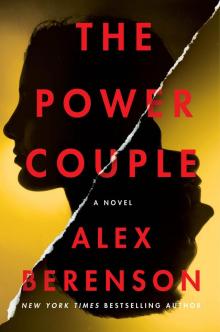 The Power Couple
The Power Couple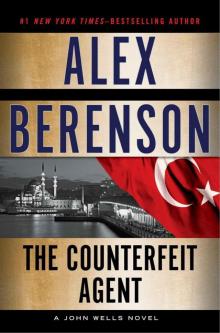 The Counterfeit Agent
The Counterfeit Agent The Midnight House
The Midnight House The Prisoner
The Prisoner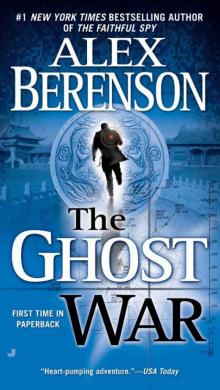 The Ghost War
The Ghost War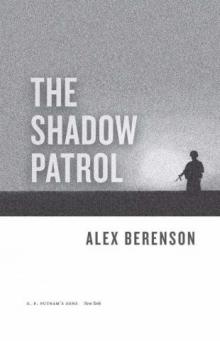 The Shadow Patrol jw-6
The Shadow Patrol jw-6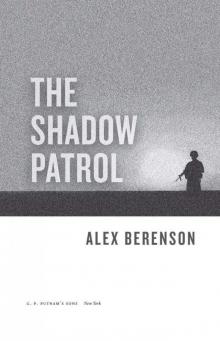 The Shadow Patrol
The Shadow Patrol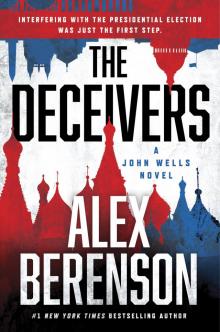 The Deceivers
The Deceivers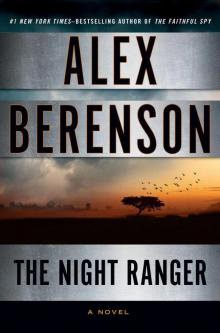 The Night Ranger jw-7
The Night Ranger jw-7 The Faithful Spy
The Faithful Spy The Prince of Beers (Kindle Single)
The Prince of Beers (Kindle Single)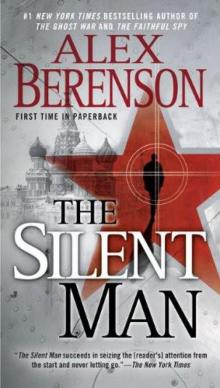 The Silent Man jw-3
The Silent Man jw-3 The Silent Man
The Silent Man The Wolves
The Wolves The Midnight House jw-4
The Midnight House jw-4 The Ghost Agent
The Ghost Agent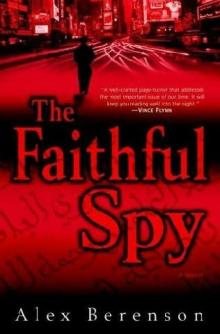 The Faithful Spy jw-1
The Faithful Spy jw-1 The Prince of Beers
The Prince of Beers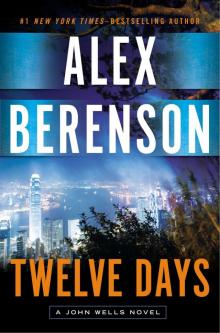 Twelve Days
Twelve Days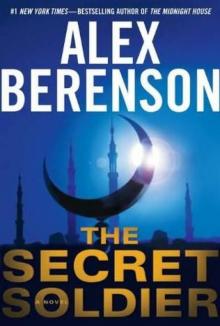 The Secret Soldier jw-5
The Secret Soldier jw-5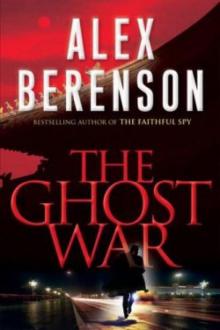 The Ghost War jw-2
The Ghost War jw-2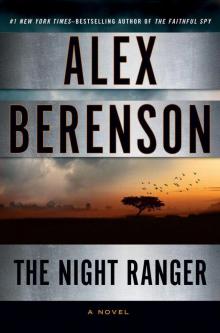 The Night Ranger
The Night Ranger